Teen Gets Scolded By Mom For Refusing To Let Her Flea-Ridden Dog Sleep With Her On The Bed
Keeping your pet flea-free is no small task. It can take considerable effort and dedication to ensure that your pup is comfortable in its fur!
Fortunately, there are several effective methods to eliminate fleas from your dog with relative ease. Start by giving them a thorough bath with flea-repellent shampoo, and then regularly vacuum around their sleeping areas.
Diligent brushing will also help remove eggs, larvae, and adult fleas, allowing you to eradicate them for good. After that, the best way to keep them away is to consult your vet about monthly anti-parasite treatments, giving you peace of mind knowing your furry friend won't suffer from any more itchy scratches!
Unfortunately, not all families care enough to protect these furballs from fleas. Some parents even leave the responsibility of caring for dogs entirely to their children and teenagers.
Moms and dads shouldn't expect their children to handle all of the dog's physical issues, especially when a vet is needed. Dogs are primarily their responsibility.
Recently, a teenager posted on the “Am I The A**hole?” (AITA) subreddit about her dilemma. The original poster stated that she was scolded by her mom when she refused to let one of their dogs sleep on her bed.
Was she wrong to refuse? She asked the AITA community.
The OP normally lets the dog sleep on her bed.
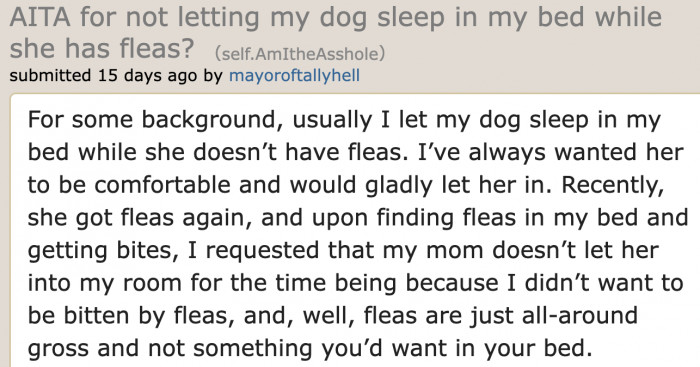
It seems the mom overreacted here.
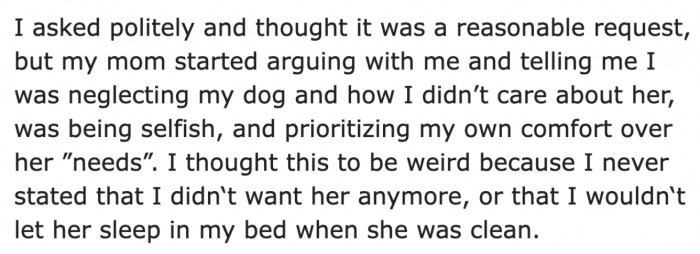
Now, this mom is telling her daughter that she's "selfish."

The Psychological Impact of Pet Ownership on Family Dynamics
Pets can significantly influence family relationships and individual well-being. Research published in the Journal of Family Psychology indicates that pets often serve as sources of comfort and companionship but can also create stress when their needs conflict with family members' preferences. In this case, the teen's refusal to let the flea-ridden dog sleep on the bed may stem from concerns about health and comfort, reflecting a deeper need for personal autonomy.
Understanding these dynamics is crucial for addressing conflicts regarding pet care within families.
Understanding Parental Expectations
Parental expectations can significantly impact adolescent behavior and self-esteem.
Research published in the Journal of Adolescent Health shows that when parents impose their expectations on children, it can lead to feelings of inadequacy and rebellion.
It’s important for parents to recognize the potential negative effects of their demands, especially regarding personal space and comfort.
Sadly, the OP can't do anything about her unreasonable mom.

The OP reveals that they have many pets at home.
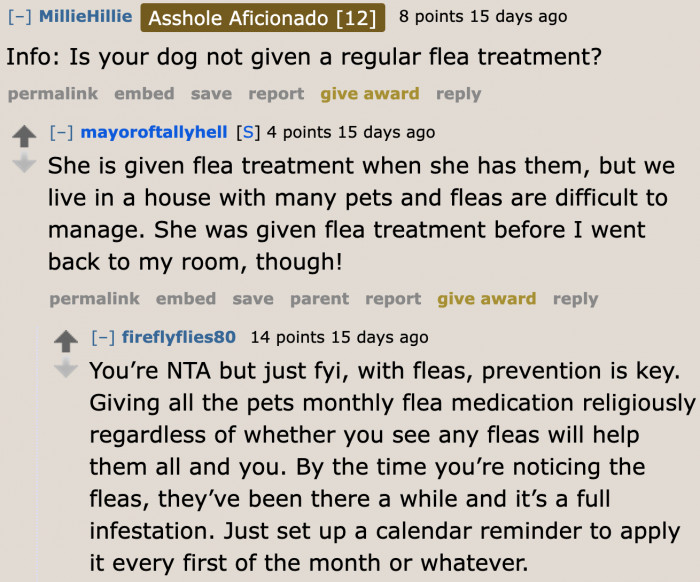
With the number of pets they have, this family finds it hard to manage the fleas.
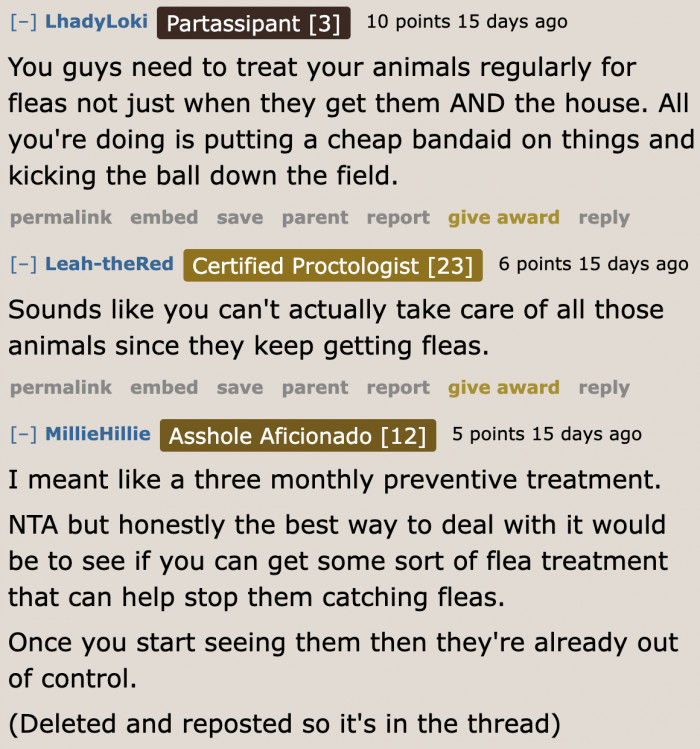
Moreover, the presence of pets can sometimes lead to feelings of guilt or obligation among family members. Studies show that individuals may feel pressured to accommodate pets, even when it affects their comfort or well-being. Recognizing these feelings is important for fostering healthy family interactions and ensuring that everyone's needs are met.
This situation illustrates the complexities of familial relationships, particularly regarding boundaries and personal comfort.
Studies indicate that when young adults feel pressured to conform to parental expectations, it can lead to conflict and resentment.
Encouraging open dialogues about personal boundaries can foster healthier relationships.
The mom is a poor pet owner.
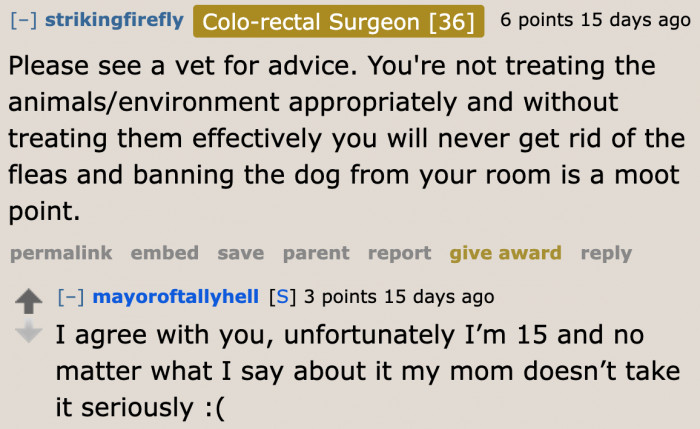
Exactly! Let the dog sleep on her mom's bed if she's this concerned.

The dog was recently treated for fleas.

The Role of Boundaries in Family Relationships
Establishing boundaries is essential for maintaining personal comfort and well-being within family dynamics. According to Dr. Michael Thompson, a child psychologist, "Setting limits is crucial for our emotional health, especially in family relationships." In this scenario, the teen's refusal to share her bed with the dog can be viewed as a necessary boundary to maintain her comfort and emotional well-being. Encouraging family members to communicate their boundaries openly can help create a more harmonious living environment, as noted by Dr. Jane Nelsen, who states, "Respecting each other's boundaries fosters understanding and strengthens family bonds."
The Psychological Effects of Conflict Over Pets
Conflicts surrounding pet care can lead to significant emotional distress for both parents and adolescents.
Research suggests that pets often serve as emotional anchors, and when their care is contested, it can heighten existing tensions.
Understanding the underlying emotional connections to pets is crucial for resolving these conflicts.
Fleas can transmit diseases to humans. It's best to have the dog sleep somewhere else while it has fleas.

Considering the mom's actions, she definitely is toxic and a gaslighter.

The OP needs to address her surroundings too. Fleas might have laid eggs in parts of her room.

In instances where boundaries are tested, family therapy can provide a supportive space for addressing underlying issues. Evidence suggests that therapy can help families navigate complex emotional dynamics and improve communication skills. By exploring individual needs and values, families can work towards healthier interactions.
To foster a more supportive environment, it’s essential to encourage discussions about personal boundaries and comfort levels regarding pets.
Studies emphasize that open communication can help alleviate tensions and create an atmosphere of mutual respect.
Offering alternatives, such as designated pet-free spaces, can also help address comfort concerns.
Redditor shares her experience in treating dogs for fleas.

We can all agree that the OP's stance is reasonable.

The mom needs to be educated.

Practical Solutions for Managing Pet Care Conflicts
To address conflicts regarding pet care, families can implement clear guidelines for pet responsibilities. Research indicates that having designated roles can reduce tensions and ensure that everyone's needs are respected. Establishing a family meeting to discuss pet care can foster collaboration and understanding among family members.
Additionally, involving all family members in pet care can help alleviate feelings of burden. Sharing responsibilities can create a sense of teamwork and promote emotional bonds between family members and their pets.
Actionable Strategies for Conflict Resolution
Encouraging families to engage in regular family meetings can foster open communication about boundaries and expectations.
Research shows that family meetings can enhance understanding and cooperation among family members.
Additionally, establishing clear guidelines about pet care and boundaries can help minimize conflict.
She isn't being selfish. The OP only wants to protect herself from fleas.

Definitely!

A Redditor believes that dogs should never be allowed to sleep on a human's bed.

This user disagrees with the above statement.

A user defends their point.

It is gross indeed!

Redditors sided with the OP and criticized her mom for being unreasonable. If you look at the situation, the mom clearly doesn't understand her priorities.
She's the parent, so she should be the one solving the problem with the dogs. If parents can't take care of their pets properly and simply leave the responsibilities to their children, then it's better not to get a pet at all!
Psychological Analysis
This situation reflects the complexities of parental expectations and their impact on adolescent comfort levels. When personal space is compromised, it can lead to feelings of frustration and resentment. Open communication about boundaries and individual needs is essential for maintaining healthy family dynamics.
Analysis generated by AI
Analysis & Alternative Approaches
In conclusion, addressing parental expectations and personal boundaries is key to fostering healthy family dynamics.
By encouraging open discussions about comfort levels and boundaries, families can reduce conflict and enhance emotional connections.
As research suggests, prioritizing communication can lead to healthier relationships and greater understanding among family members.
Analysis & Alternative Approaches
In conclusion, managing pet care conflicts within families requires open communication and a willingness to establish boundaries. Research indicates that understanding individual needs is essential for maintaining harmony in family dynamics. By fostering collaboration and respect, families can create a supportive environment for both their members and their pets.



